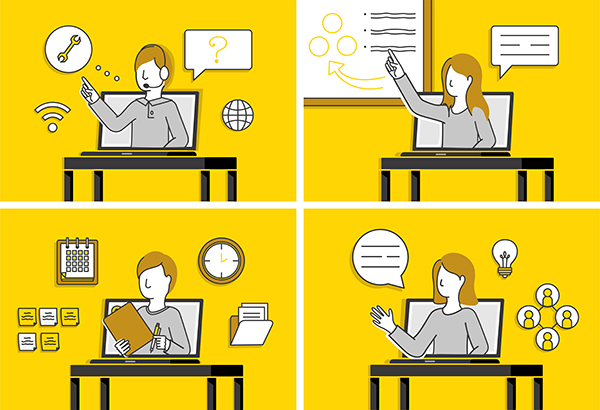Four Roles You Must Have in the Virtual Room for a Successful Remote Ideation Session.
For higher-level guidance on successfully innovating at a social distance, see the first blog in our virtual teamwork series, “What Does Innovating at a Social Distance Look Like? Three Practical Tips.”
So, you’re planning your first remote ideation session or brainstorm-heavy workshop. Congratulations! You have the chance to take advantage of the surprising benefits of all-virtual ideation sessions, and get a badge of honor for being a bit of a pioneer. You also have the opportunity to plan well for your engagement, and that starts with carefully selecting the people you have on-board to support your effort as part of the ideation process.
From experience (more than we can count- virtual innovation and ideation sessions), we’ve found it’s vital to have the following four roles well defined and staffed for ahead of time before anyone even thinks about opening their laptop and signing into Zoom:
Master Facilitator
Part sideshow hustler, part emcee, your master facilitator is, in effect, your master of ceremonies for the ideation session. This person should be an ideation process specialist, engaging, improvisation-ready, and able to sustain a level of “extra” for periods that would exhaust the average person. “Yes, and…” is this brave soul’s all-time favorite phrase.
Breakout Room Facilitator
If you are conducting breakout sessions, you’ll also need a few capable breakout room facilitators for the remote ideation session to moderate the small group collaborations that orbit the more significant innovation and ideation exercises. These folks should be organized, great conversation starters and active ideation process cheerleaders focused on facilitating maximum participation and creative output.
Behind-The-Scenes Curator
Every virtual remote ideation session and collaborative workshop needs a behind the scenes mastermind, an organizational puppeteer if you will, dedicated to taking in large amounts of information and categorizing and synthesizing it for use after each session. This job title requires someone who’s at least detail-oriented and at best-case, detail-obsessed, someone who delights in having truckloads of information backed up to their digital doors and asked to dive in and sort and synthesize to their hearts’ content.
Technology Guru
In-person, you’ve got visible IT support – a person or two called in to stop the presses and fix broken equipment or mitigate user error. The problem: that often happens mid-stream, derailing the flow of your workshop and causing participants to disappear into their phones.
When innovating virtually, however, tech support can go on behind the scenes, without a hard stop to the action or the disruption of a new face in the room. Facilitators need to be ready to pivot or redirect away from tech problems, but tech gurus should be laser-focused on solving them, full stop.
One final thing worth remembering when defining your team: Don’t ask people to do too much multitasking in the ideation session. Ideally, each person should have a clear idea of their responsibilities, and each role should belong to a single person. A facilitator should not, for example, also play Technology Guru. The more ambiguity to the job or the more roles you place on one person, the more diluted their focus – and ability to perform – becomes.
Read more of our tips for remote ideation and innovating in the age of isolation on the THRIVE blog.
Need help planning, creating, or running a virtual research or collaboration project? Let’s talk. Contact THRIVE to discuss how we might help you facilitate digital collaboration today.








